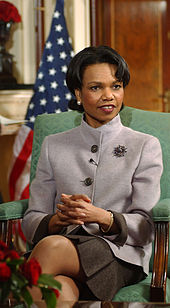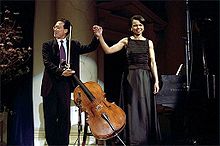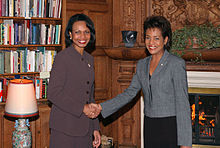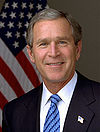- Condoleezza Rice
-
Condoleezza Rice 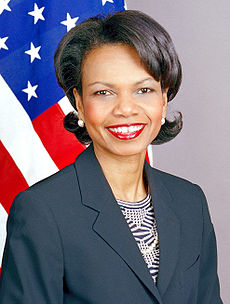
66th United States Secretary of State In office
January 26, 2005 – January 20, 2009President George W. Bush Deputy Richard Armitage (2005)
Robert Zoellick (2005–2006)
John Negroponte (2007–2009)Preceded by Colin Powell Succeeded by Hillary Rodham Clinton 20th United States National Security Advisor In office
January 20, 2001 – January 26, 2005President George W. Bush Deputy Stephen Hadley Preceded by Sandy Berger Succeeded by Stephen Hadley Provost of Stanford University In office
1993–1999Preceded by Gerald J. Lieberman Succeeded by John L. Hennessy Personal details Born November 14, 1954
Birmingham, AlabamaPolitical party Republican Alma mater University of Denver (BA, PhD)
University of Notre Dame (MA)Profession Professor, Provost, Diplomat, Politician Religion Presbyterian Signature 
Condoleezza Rice (
 /ˌkɒndəˈliːzə/ kon-də-lee-zə; born November 14, 1954) is an American political scientist and diplomat. She served as the 66th United States Secretary of State, and was the second person to hold that office in the administration of President George W. Bush. Rice was the first female African-American secretary of state, as well as the second African American (after Colin Powell), and the second woman (after Madeleine Albright). Rice was President Bush's National Security Advisor during his first term, making her the first woman to serve in that position. Before joining the Bush administration, she was a professor of political science at Stanford University where she served as Provost from 1993 to 1999. Rice also served on the National Security Council as the Soviet and East European Affairs Advisor to President George H.W. Bush during the dissolution of the Soviet Union and German reunification.
/ˌkɒndəˈliːzə/ kon-də-lee-zə; born November 14, 1954) is an American political scientist and diplomat. She served as the 66th United States Secretary of State, and was the second person to hold that office in the administration of President George W. Bush. Rice was the first female African-American secretary of state, as well as the second African American (after Colin Powell), and the second woman (after Madeleine Albright). Rice was President Bush's National Security Advisor during his first term, making her the first woman to serve in that position. Before joining the Bush administration, she was a professor of political science at Stanford University where she served as Provost from 1993 to 1999. Rice also served on the National Security Council as the Soviet and East European Affairs Advisor to President George H.W. Bush during the dissolution of the Soviet Union and German reunification.Following her confirmation as Secretary of State, Rice pioneered the policy of Transformational Diplomacy, with a focus on democracy in the Greater Middle East. Her emphasis on supporting democratically elected governments faced challenges as Hamas captured a popular majority in Palestinian elections, and influential countries including Saudi Arabia and Egypt maintained authoritarian systems with U.S. support. While Secretary of State, she chaired the Millennium Challenge Corporation's board of directors.[1]
In March 2009, Rice returned to Stanford University as a political science professor and the Thomas and Barbara Stephenson Senior Fellow on Public Policy at the Hoover Institution.[2][3] In September 2010, Rice became a faculty member of the Stanford Graduate School of Business and a director of its Global Center for Business and the Economy.[4]
Early life
Rice was born in Birmingham, Alabama the only child of Angelena Ray Rice, a high school science, music and oratory teacher, and John Wesley Rice, Jr., a high school guidance counselor and Presbyterian minister.[5] Her name, Condoleezza, derives from the music-related term, con dolcezza, which in Italian means, "with sweetness". The family had roots in the American South going back to the pre-Civil War era, and worked as sharecroppers for a time after emancipation. Rice grew up in the Titusville[citation needed] neighborhood at a time when the South was racially segregated.
Early education
 Condoleezza Rice as an undergraduate student at the University of Denver
Condoleezza Rice as an undergraduate student at the University of Denver
Rice began to learn French, music, figure skating and ballet at the age of three.[6] At the age of fifteen, she began piano classes with the goal of becoming a concert pianist.[7] While Rice ultimately did not become a professional pianist, she still practices often and plays with a chamber music group. She accompanied cellist Yo-Yo Ma playing Brahms's Violin Sonata in D Minor at Constitution Hall in April 2002 for the National Medal of Arts Awards.[8]
High school and university education
In 1967, the family moved to Denver, Colorado. She attended St. Mary's Academy, an all-girls Catholic high school in Cherry Hills Village, Colorado, graduating in 1971. After studying piano at the Aspen Music Festival and School, Rice enrolled at the University of Denver, where her father was then serving as an assistant dean.
Rice's initial college major was piano, but after realizing she did not have the talent to play professionally, she began to consider an alternative major.[7][9] She attended an international politics course taught by Josef Korbel, which sparked her interest in the Soviet Union and international relations. Rice later described Korbel (who was the father of Madeleine Albright, a future U.S. Secretary of State), as a central figure in her life.[10]
In 1974, at age 19, Rice was inducted into the honor society Phi Beta Kappa, and was awarded a B.A., cum laude, in political science by the University of Denver. While at the University of Denver she was a member of Alpha Chi Omega, Gamma Delta chapter.[11] She obtained a master's degree in political science from the University of Notre Dame in 1975. She first worked in the State Department in 1977, during the Carter administration, as an intern in the Bureau of Educational and Cultural Affairs. In 1981, at the age of 26, she received her Ph.D. in political science from the Josef Korbel School of International Studies at the University of Denver. Her dissertation centered on military policy and politics in what was then the communist state of Czechoslovakia.[12]
Early political views
Rice was a Democrat until 1982, when she changed her political affiliation to Republican, in part because she disagreed with the foreign policy of Democratic President Jimmy Carter,[13][14] and because of the influence of her father, who was Republican. As she told the 2000 Republican National Convention, "My father joined our party because the Democrats in Jim Crow Alabama of 1952 would not register him to vote. The Republicans did."[15]
Academic career
Rice was hired by Stanford University as an assistant professor of political science (1981–1987). She was promoted to associate professor in 1987, a post she held until 1993. She was a specialist on the Soviet Union and gave lectures on the subject for the Berkeley-Stanford joint program led by UC Berkeley Professor George Breslauer in the mid-1980s.
At a 1985 meeting of arms control experts at Stanford, Rice's performance drew the attention of Brent Scowcroft, who had served as National Security Advisor under Gerald Ford.[16] With the election of George H. W. Bush, Scowcroft returned to the White House as National Security Adviser in 1989, and he asked Rice to become his Soviet expert on the United States National Security Council. According to R. Nicholas Burns, President Bush was "captivated" by Rice, and relied heavily on her advice in his dealings with Mikhail Gorbachev and Boris Yeltsin.[16]
Because she would have been ineligible for tenure at Stanford if she had been absent for more than two years, she returned there in 1991. She was taken under the wing of George P. Shultz (Ronald Reagan's Secretary of State from 1982–1989), who was a fellow at the Hoover Institution. Shultz included Rice in a "luncheon club" of intellectuals who met every few weeks to discuss foreign affairs.[16] In 1992, Shultz, who was a board member of Chevron Corporation, recommended Rice for a spot on the Chevron board. Chevron was pursuing a $10 billion development project in Kazakhstan and, as a Soviet specialist, Rice knew the President of Kazakhstan, Nursultan Nazarbayev. She traveled to Kazakhstan on Chevron's behalf and, in honor of her work, in 1993, Chevron named a 129,000-ton supertanker SS Condoleezza Rice.[16] During this period, Rice was also appointed to the boards of Transamerica Corporation (1991) and Hewlett-Packard (1992).
At Stanford, in 1992, Rice volunteered to serve on the search committee to replace outgoing president Donald Kennedy. The committee ultimately recommended Gerhard Casper, the Provost of the University of Chicago. Casper met Rice during this search, and was so impressed that in 1993, he appointed her as Stanford's Provost, the chief budget and academic officer of the university in 1993[16] and she also was granted tenure and became full professor.[17] Rice was the first female, first minority, and youngest Provost in Stanford history.[18] She was also named a senior fellow of the Institute for International Studies, and a senior fellow (by courtesy) of the Hoover Institution.
Provost promotion
Former Stanford President Gerhard Casper said the university was "most fortunate in persuading someone of Professor Rice's exceptional talents and proven ability in critical situations to take on this task. Everything she has done, she has done well; I have every confidence that she will continue that record as provost."[19] Acknowledging Rice's unique character, Casper told the New Yorker in 2002 that it "would be disingenuous for me to say that the fact that she was a woman, the fact that she was black and the fact that she was young weren't in my mind."[20]
Balancing school budget
As Stanford's Provost, Rice was responsible for managing the university's multi-billion dollar budget. The school at that time was running a deficit of $20 million. When Rice took office, she promised that the budget deficit would be balanced within "two years." Coit Blacker, Stanford's deputy director of the Institute for International Studies, said there "was a sort of conventional wisdom that said it couldn't be done... that [the deficit] was structural, that we just had to live with it." Two years later, Rice announced that the deficit had been eliminated and the university was holding a record surplus of over $14.5 million.[21]
Special interest issues
Rice drew protests when, as provost, she departed from the practice of applying affirmative action to tenure decisions and unsuccessfully sought to consolidate the university's ethnic community centers.[22]
Return to Stanford
During a farewell interview in early December 2008, Rice indicated she would return to Stanford and the Hoover Institution, "back west of the Mississippi where I belong," but beyond writing and teaching did not specify what her role would be.[23] Rice's plans for a return to campus were elaborated in an interview with the Stanford Report in January 2009.[24] She returned to Stanford as a political science professor and senior fellow at the Hoover Institution on March 1, 2009.[25]
Music
Rice is an accomplished pianist and has performed in public since she was a young girl. At the age of 15, she played Mozart with the Denver Symphony, and while Secretary of State she played regularly with a chamber music group in Washington.[8] She does not play professionally, but has performed at diplomatic events at embassies, including a performance for Queen Elizabeth II,[26][27] and she has performed in public with cellist Yo-Yo Ma and singer Aretha Franklin.[28] In 2005, Rice accompanied Charity Sunshine Tillemann-Dick, a 21 year-old soprano, for a benefit concert for the Pulmonary Hypertension Association at the Kennedy Center in Washington.[29][30] She has stated that her favorite composer is Johannes Brahms, because she thinks Brahms's music is "passionate but not sentimental." On a complementary note, on Friday, April 10, 2009 on The Tonight Show with Jay Leno, she stated that her favorite band is Led Zeppelin.
Private sector
Rice headed Chevron's committee on public policy until she resigned on January 15, 2001, to become National Security Advisor to President George W. Bush. Chevron, for unspecified reasons, honored Rice by naming an oil tanker Condoleezza Rice after her, but controversy led to its being renamed Altair Voyager.[31]
She also served on the board of directors for the Carnegie Corporation, the Charles Schwab Corporation, the Chevron Corporation, Hewlett Packard, the Rand Corporation, the Transamerica Corporation, and other organizations.
In 1992, Rice founded the Center for New Generation, an after-school program created to raise the high school graduation numbers of East Palo Alto and eastern Menlo Park, California.[32] After her tenure as secretary of state, Rice was approached in February 2009 to fill an open position as a Pac-10 Commissioner,[33] but chose instead to return to Stanford University as a political science professor and the Thomas and Barbara Stephenson Senior Fellow on Public Policy at the Hoover Institution.
Early political career
In 1986, while an international affairs fellow of the Council on Foreign Relations, Rice served as Special Assistant to the Director of the Joint Chiefs of Staff.
From 1989 through March 1991 (the period of the fall of Berlin Wall and the final days of the Soviet Union), she served in President George H.W. Bush's administration as Director, and then Senior Director, of Soviet and East European Affairs in the National Security Council, and a Special Assistant to the President for National Security Affairs. In this position, Rice helped develop Bush's and Secretary of State James Baker's policies in favor of German reunification. She impressed Bush, who later introduced her to Soviet leader Mikhail Gorbachev, as the one who "tells me everything I know about the Soviet Union."[34]
In 1991, Rice returned to her teaching position at Stanford, although she continued to serve as a consultant on the former Soviet Bloc for numerous clients in both the public and private sectors. Late that year, California Governor Pete Wilson appointed her to a bipartisan committee that had been formed to draw new state legislative and congressional districts in the state.
In 1997, she sat on the Federal Advisory Committee on Gender-Integrated Training in the Military.
During George W. Bush's 2000 presidential election campaign, Rice took a one-year leave of absence from Stanford University to help work as his foreign policy advisor. The group of advisors she led called itself The Vulcans in honor of the monumental Vulcan statue, which sits on a hill overlooking her hometown of Birmingham, Alabama. Rice would later go on to give a noteworthy speech at the 2000 Republican National Convention. The speech asserted that "...America's armed forces are not a global police force. They are not the world's 911."[15][35]
National Security Advisor (2001–2005)
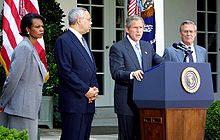 Rice, Secretary of State Colin Powell, and Secretary of Defense Donald Rumsfeld listen to President George W. Bush speak about the Middle East on June 24, 2002
Rice, Secretary of State Colin Powell, and Secretary of Defense Donald Rumsfeld listen to President George W. Bush speak about the Middle East on June 24, 2002
On December 17, 2000, Rice was named as National Security Advisor and stepped down from her position at Stanford.[36] She was the first woman to occupy the post. Rice earned the nickname of "Warrior Princess," reflecting strong nerve and delicate manners.[37]
On January 18, 2003, the Washington Post reported that Rice was involved in crafting Bush's position on race-based preferences. Rice has stated that "while race-neutral means are preferable," race can be taken into account as "one factor among others" in university admissions policies.[38]
Terrorism
During the summer of 2001, Rice met with CIA Director George Tenet to discuss the possibilities and prevention of terrorist attacks on American targets. On July 10, 2001, Rice met with Tenet in what he referred to as an "emergency meeting"[39] held at the White House at Tenet's request to brief Rice and the NSC staff about the potential threat of an impending al Qaeda attack. Rice responded by asking Tenet to give a presentation on the matter to Secretary Donald Rumsfeld and Attorney General John Ashcroft.[40]
When asked about the meeting in 2006, Rice asserted she did not recall the specific meeting, commenting that she had met repeatedly with Tenet that summer about terrorist threats. Moreover, she stated that it was "incomprehensible" to her that she had ignored terrorist threats two months before the September 11 attacks.[39]
In August, 2010, Rice received the U.S. Air Force Academy's 2009 Thomas D. White National Defense Award for contributions to the defense and security of the United States.[41]
Subpoenas
In March 2004, Rice declined to testify before the National Commission on Terrorist Attacks Upon the United States (the 9/11 Commission). The White House claimed executive privilege under constitutional separation of powers and cited past tradition. Under pressure, Bush agreed to allow her to testify[42] so long as it did not create a precedent of presidential staff being required to appear before United States Congress when so requested. Her appearance before the commission on April 8, 2004, was accepted by the Bush administration in part because she was not appearing directly before Congress. She thus became the first sitting National Security Advisor to testify on matters of policy.
In April 2007, Rice rejected, on grounds of executive privilege, a House subpoena regarding the prewar claim that Iraq sought yellowcake uranium from Niger.[43]
Iraq
Rice was a proponent of the 2003 invasion of Iraq. After Iraq delivered its declaration of weapons of mass destruction to the United Nations on December 8, 2002, Rice wrote an editorial for The New York Times entitled "Why We Know Iraq Is Lying".[44]
In October 2003, Rice was named to run the Iraq Stabilization Group, to “quell violence in Iraq and Afghanistan and to speed the reconstruction of both countries."[45] By May 2004, the Washington Post reported that the council had become virtually nonexistent.[46]
Leading up to the 2004 presidential election, Rice became the first National Security Advisor to campaign for an incumbent president. She stated that while: "Saddam Hussein had nothing to do with the actual attacks on America, Saddam Hussein's Iraq was a part of the Middle East that was festering and unstable, [and] was part of the circumstances that created the problem on September 11."[47]
Weapons of mass destruction
In a January 10, 2003 interview with CNN's Wolf Blitzer, Rice made headlines by stating regarding Iraqi WMD: "The problem here is that there will always be some uncertainty about how quickly he can acquire nuclear weapons. But we don't want the smoking gun to be a mushroom cloud."[48]
After the invasion, when it became clear that Iraq did not have nuclear WMD capability, critics called Rice's claims a "hoax," "deception" and "demagogic scare tactic."[49][50] "Either she missed or overlooked numerous warnings from intelligence agencies seeking to put caveats on claims about Iraq's nuclear weapons program, or she made public claims that she knew to be false," wrote Dana Milbank and Mike Allen in the Washington Post.[51]
Rice characterized the August 6, 2001 President's Daily Brief Bin Ladin Determined To Strike in US as historical information. Rice indicated "It was information based on old reporting."[52] Sean Wilentz of Salon magazine suggested that the PDB contained current information based on continuing investigations, including that Bin Laden wanted to "bring the fighting to America."[53]
Role in authorizing use of torture techniques
A Senate Intelligence Committee reported that on July 17, 2002, Rice met with CIA director George Tenet to personally convey the Bush administration's approval of the proposed waterboarding of alleged Al Qaeda leader Abu Zubaydah. "Days after Dr Rice gave Mr Tenet her approval, the Justice Department approved the use of waterboarding in a top secret August 1 memo."[54] Waterboarding is considered to be torture by a wide range of authorities, including legal experts,[55][56][57][58] war veterans,[59][60] intelligence officials,[61] military judges,[62] human rights organizations,[63][64][65][66][67][68][69][70] the U.S. Attorney General Eric Holder,[71] and many senior politicians, including U.S. President Barack Obama.[72]
In 2003 Rice, Vice President Dick Cheney and Attorney General John Ashcroft met with the CIA again and were briefed on the use of waterboarding and other methods including week-long sleep deprivation, forced nudity and the use of stress positions. The Senate report says that the Bush administration officials "reaffirmed that the CIA program was lawful and reflected administration policy".[54]
The Senate report also "suggests Miss Rice played a more significant role than she acknowledged in written testimony to the Senate Armed Services Committee submitted in the autumn."[54] At that time, she had acknowledged attending meetings to discuss the CIA interrogations, but she claimed that she could not recall the details, and she "omitted her direct role in approving the programme in her written statement to the committee."[73]
In a conversation with a student at Stanford University in April 2009, Rice stated that she did not authorize the CIA to use the enhanced interrogation techniques. Said Rice, "I didn't authorize anything. I conveyed the authorization of the administration to the agency that they had policy authorization, subject to the Justice Department's clearance. That's what I did."[74] She added, “We were told, nothing that violates our obligations under the Convention Against Torture. And so, by definition, if it was authorized by the president, it did not violate our obligations under the Conventions Against Torture."[74]
Secretary of State (2005–2009)
Main article: Condoleezza Rice's tenure as Secretary of State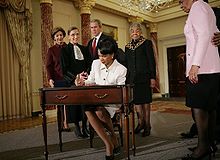 Rice signs official papers after receiving the oath of office during her ceremonial swearing in at the Department of State. Watching on are, from left, Laura Bush, Justice Ruth Bader Ginsburg, President George W. Bush.
Rice signs official papers after receiving the oath of office during her ceremonial swearing in at the Department of State. Watching on are, from left, Laura Bush, Justice Ruth Bader Ginsburg, President George W. Bush.
On November 16, 2004, Bush nominated Rice to be Secretary of State. On January 26, 2005, the Senate confirmed her nomination by a vote of 85–13. The negative votes, the most cast against any nomination for Secretary of State since 1825, came from Senators who, according to Senator Barbara Boxer, wanted "to hold Dr. Rice and the Bush administration accountable for their failures in Iraq and in the war on terrorism." Their reasoning was that Rice had acted irresponsibly in equating Saddam's regime with Islamist terrorism and some could not accept her previous record. Senator Robert Byrd voted against Rice's appointment, indicating that she "has asserted that the President holds far more of the war power than the Constitution grants him."[75]
As Secretary of State, Rice championed the expansion of democratic governments. Rice stated that the September 11 attacks in 2001 were rooted in "oppression and despair" and so, the US must advance democratic reform and support basic rights throughout the greater Middle East.[76] Rice also reformed and restructured the department, as well as US diplomacy as a whole. "Transformational Diplomacy" is the goal that Rice describes as "work[ing] with our many partners around the world... [and] build[ing] and sustain[ing] democratic, well-governed states that will respond to the needs of their people and conduct themselves responsibly in the international system."[77]
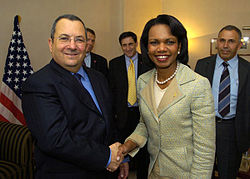 Israeli Defense Minister Ehud Barak and Condoleezza Rice (2007)
Israeli Defense Minister Ehud Barak and Condoleezza Rice (2007)
As Secretary of State, Rice traveled widely and initiated many diplomatic efforts on behalf of the Bush administration. Her diplomacy relied on strong presidential support and is considered to be the continuation of style defined by former Republican secretaries of state Henry Kissinger and James Baker.[78]
Speculation on 2008 presidential campaign, views on successor
There had been previous speculation that Rice would run for the Republican nomination in the 2008 primaries, which she ruled out on Meet the Press. On February 22, 2008, Rice played down any suggestion that she may be on the Republican vice presidential ticket, saying, "I have always said that the one thing that I have not seen myself doing is running for elected office in the United States."[79] During an interview with the editorial board of the Washington Times on March 27, 2008, Rice said she was "not interested" in running for vice president.[80] In a Gallup poll from March 24 to 27, 2008, Rice was mentioned by eight percent of Republican respondents to be their first choice to be Senator John McCain's Republican Vice-Presidential running mate, slightly behind Mike Huckabee and Mitt Romney.[81]
Republican strategist Dan Senor said on ABC's This Week on April 6, 2008, that "Condi Rice has been actively, actually in recent weeks, campaigning for" the vice presidential nomination. He based this assessment on her attendance of Grover Norquist's Americans for Tax Reform conservative leader's meeting on March 26, 2008.[82] In response to Senor's comments, Rice's spokesperson denied that Rice is seeking the vice presidential nomination, saying, "If she is actively seeking the vice presidency, then she's the last one to know about it."[83]
In August 2008, the speculation about a potential McCain-Rice ticket finally ended when then-Governor Sarah Palin of Alaska was selected as McCain's running-mate.
In early December 2008, Rice praised President-elect Barack Obama's selection of New York Senator Hillary Clinton to succeed her as Secretary of State, saying "she's terrific". Rice, who has spoken to Clinton since her selection, said Clinton "is someone of intelligence and she'll do a great job".[84]
Political positions
Terrorist activity
Rice's policy as Secretary of State viewed counter-terrorism as a matter of being preventative, and not merely punitive. In an interview on December 18, 2005, Rice stated: "We have to remember that in this war on terrorism, we're not talking about criminal activity where you can allow somebody to commit the crime and then you go back and you arrest them and you question them. If they succeed in committing their crime, then hundreds or indeed thousands of people die. That's why you have to prevent, and intelligence is the long pole in the tent in preventing attacks."[85]
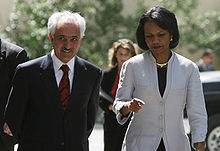 Rice meets with Afghan Foreign Minister Spanta to discuss anti-terrorism efforts
Rice meets with Afghan Foreign Minister Spanta to discuss anti-terrorism efforts
Rice has also been a frequent critic of the intelligence community's inability to cooperate and share information, which she believes is an integral part of preventing terrorism. In 2000, one year after Osama bin Laden told Time “[h]ostility toward America is a religious duty,"[35] and a year before the September 11 terrorist attacks, Rice warned on WJR Detroit: "You really have to get the intelligence agencies better organized to deal with the terrorist threat to the United States itself. One of the problems that we have is a kind of split responsibility, of course, between the CIA and foreign intelligence and the FBI and domestic intelligence." She then added: "There needs to be better cooperation because we don't want to wake up one day and find out that Osama bin Laden has been successful on our own territory."[86]
Rice also has promoted the idea that counterterrorism involves not only confronting the governments and organizations that promote and condone terrorism, but also the ideologies that fuel terrorism. In a speech given on July 29, 2005, Rice asserted that "[s]ecuring America from terrorist attack is more than a matter of law enforcement. We must also confront the ideology of hatred in foreign societies by supporting the universal hope of liberty and the inherent appeal of democracy."[87]
In January 2005, during Bush's second inaugural ceremonies, Rice first used the term "outposts of tyranny" to refer to countries felt to threaten world peace and human rights. This term has been called a descendant of Bush's phrase, "Axis of Evil", used to describe Iraq, Iran and North Korea. She identified six such "outposts" in which she said the United States has a duty to foster freedom: Cuba, Zimbabwe, Burma and Belarus, as well as Iran and North Korea.
Abortion
Rice said "If you go back to 2000 when I helped the president in the campaign. I said that I was, in effect, kind of libertarian on this issue. And meaning by that, that I have been concerned about a government role in this issue. I am a strong proponent of parental choice—of parental notification. I am a strong proponent of a ban on late-term abortion. These are all things that I think unite people and I think that that's where we should be. I've called myself at times mildly pro-choice."[88] She would not want the federal government "forcing its views on one side or the other."[89]
Rice said she believes President Bush "has been in exactly the right place" on abortion, "which is we have to respect the culture of life and we have to try and bring people to have respect for it and make this as rare a circumstance as possible" However, she added that she has been "concerned about a government role" but has "tended to agree with those who do not favor federal funding for abortion, because I believe that those who hold a strong moral view on the other side should not be forced to fund" the procedure.[89]
Discrimination
Rice experienced firsthand the injustices of Birmingham's discriminatory laws and attitudes. She was instructed to walk proudly in public and to use the facilities at home rather than subject herself to the indignity of "colored" facilities in town. As Rice recalls of her parents and their peers, "they refused to allow the limits and injustices of their time to limit our horizons."[90]
However, Rice recalls various times in which she suffered discrimination on account of her race, which included being relegated to a storage room at a department store instead of a regular dressing room, being barred from going to the circus or the local amusement park, being denied hotel rooms, and even being given bad food at restaurants.[91] Also, while Rice was mostly kept by her parents from areas where she might face discrimination, she was very aware of the civil rights struggle and the problems of Jim Crow laws in Birmingham. A neighbor, Juliemma Smith, described how "[Condi] used to call me and say things like, 'Did you see what Bull Connor did today?' She was just a little girl and she did that all the time. I would have to read the newspaper thoroughly because I wouldn't know what she was going to talk about."[91] Rice herself said of the segregation era: "Those terrible events burned into my consciousness. I missed many days at my segregated school because of the frequent bomb threats."[91]
During the violent days of the Civil Rights Movement, Reverend Rice armed himself and kept guard over the house while Condoleezza practiced the piano inside. According to J.L. Chestnut, Reverend Rice called local civil rights leader Fred Shuttlesworth and his followers "uneducated, misguided Negroes."[92][93] Also, Reverend Rice instilled in his daughter and students that black people would have to prove themselves worthy of advancement, and would simply have to be "twice as good" to overcome injustices built into the system.[94] Rice said “My parents were very strategic, I was going to be so well prepared, and I was going to do all of these things that were revered in white society so well, that I would be armored somehow from racism. I would be able to confront white society on its own terms."[95] While the Rices supported the goals of the civil rights movement, they did not agree with the idea of putting their child in harm's way.[91]
Rice was eight when her schoolmate Denise McNair, aged 11, was killed in the bombing of the primarily black Sixteenth Street Baptist Church by white supremacists on September 15, 1963. Rice has commented upon that moment in her life:
I remember the bombing of that Sunday School at 16th Street Baptist Church in Birmingham in 1963. I did not see it happen, but I heard it happen, and I felt it happen, just a few blocks away at my father's church. It is a sound that I will never forget, that will forever reverberate in my ears. That bomb took the lives of four young girls, including my friend and playmate, Denise McNair. The crime was calculated to suck the hope out of young lives, bury their aspirations. But those fears were not propelled forward, those terrorists failed.[96]
— Condoleezza Rice, Commencement 2004, Vanderbilt University, May 13, 2004
Rice states that growing up during racial segregation taught her determination against adversity, and the need to be "twice as good" as non-minorities.[97] Segregation also hardened her stance on the right to bear arms; Rice has said in interviews that if gun registration had been mandatory, her father's weapons would have been confiscated, leaving them defenseless against Ku Klux Klan nightriders.[91]
Public perception and criticisms
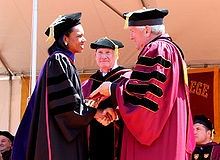 Rice makes an appearance at Boston College, where she is greeted by Father William Leahy.
Rice makes an appearance at Boston College, where she is greeted by Father William Leahy.
Rice has been criticized both in the U.S. and abroad for her involvement in the George W. Bush administration. Protesters have sought to exclude her from appearing at schools such as Princeton University[98] and Boston College,[99] which prompted the resignation of an adjunct professor at Boston College. There has also been an effort to protest her public speeches abroad.[100]
Time and Forbes magazines
Rice has appeared four times on the Time 100, Time magazine's list of the world's 100 most influential people. Rice is one of only nine people in the world whose influence has been considered enduring enough to have made the list—first compiled in 1999 as a retrospective of the twentieth century and made an annual feature in 2004—so frequently. However, the list contains people who have the influence to change for better or for worse, and Time has also accused her of squandering her influence, stating on February 1, 2007, that her "accomplishments as Secretary of State have been modest, and even those have begun to fade" and that she "has been slow to recognize the extent to which the U.S.'s prestige has declined."[101] In its March 19, 2007 issue it followed up stating that Rice was "executing an unmistakable course correction in U.S. foreign policy."[102]
In 2004 and 2005, she was ranked as the most powerful woman in the world by Forbes magazine and number two in 2006 (following the Chancellor of Germany, Angela Merkel).[103]
Criticisms from Senator Barbara Boxer
California Democratic Senator Barbara Boxer has also criticized Rice in relation to the war in Iraq: "I personally believe—this is my personal view—that your loyalty to the mission you were given, to sell the war, overwhelmed your respect for the truth."[104]
On January 11, 2007, Boxer, in a debate over the war in Iraq, said, "Now, the issue is who pays the price, who pays the price? I'm not going to pay a personal price. My kids are too old, and my grandchild is too young. You're not going to pay a particular price, as I understand it, within immediate family. So who pays the price? The American military and their families, and I just want to bring us back to that fact."
The New York Post and White House Press Secretary Tony Snow called Boxer's statement an attack on Rice's status as a single, childless female and referred to Boxer's comments as "a great leap backward for feminism."[105] Rice later echoed Snow's remarks, saying "I thought it was okay to not have children, and I thought you could still make good decisions on behalf of the country if you were single and didn't have children." Boxer responded to the controversy by saying "They're getting this off on a non-existent thing that I didn't say. I'm saying, she's like me, we do not have families who are in the military."[106]
Criticisms from John R. Bolton
According to the Washington Post in late July 2008, former Undersecretary of State and U.N. Ambassador John R. Bolton was referring to Rice and her allies in the Bush Administration who he believes have abandoned earlier hard-line principles when he said: "Once the collapse begins, adversaries have a real opportunity to gain advantage. In terms of the Bush presidency, this many reversals this close to the end destroys credibility... It appears there is no depth to which this administration will not sink in its last days."[107]
Criticism from Donald Rumsfeld
Former Secretary of Defense Donald Rumsfeld repeatedly criticized Rice after their terms in office ended. In 2011 she finally responded, saying that Rumsfeld "Doesn't know what he's talking about."[108]
Criticism from Dick Cheney
Former Vice President Dick Cheney's new book, In My Time suggested that Rice had misled the president about nuclear diplomacy with North Korea, saying she was naïve. He called her advice on the issue “utterly misleading." He also chided Rice for clashing with White House advisors on the tone of the president's speeches on Iraq. And says the secretary of state "tearfully admitted" that the Bush administration should not have apologized for a claim the president made in his 2003 State of the Union address on the supposed search for uranium. She “came into my office, sat down in the chair next to my desk, and tearfully admitted I had been right," Cheney wrote.
"It certainly doesn't sound like me, now, does it?" Rice said, saying that she viewed the book as an “attack on my integrity."[109]
Other criticism
Rice has also been criticized by other conservatives. Stephen Hayes of the Weekly Standard accused her of jettisoning the Bush Doctrine.[110] Other conservatives criticized her for her approach to Russia policy and other issues.[111] Many criticize Rice in particular for her opposition to the change of strategy in Iraq and surge in U.S. forces that began in 2007.[112]
Views within the black community
Rice's ratings decreased following a heated battle for her confirmation as Secretary of State and following Hurricane Katrina in August 2005. Rice's rise within the George W. Bush administration initially drew a largely positive response from many in the black community. In a 2002 survey, then National Security Advisor Rice was viewed favorably by 41% of black respondents, but another 40% did not know Rice well enough to rate her and her profile remained comparatively obscure.[113] As her role increased, some black commentators began to express doubts concerning Rice's stances and statements on various issues. In 2005, Washington Post columnist Eugene Robinson asked, "How did [Rice] come to a worldview so radically different from that of most black Americans?"[114]
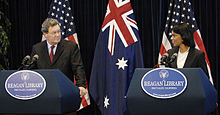 Rice and Australian Foreign Minister Alexander Downer participate in a news conference at the Ronald Reagan Presidential Library in Simi Valley, California, May 23, 2007.
Rice and Australian Foreign Minister Alexander Downer participate in a news conference at the Ronald Reagan Presidential Library in Simi Valley, California, May 23, 2007.
Other writers have also noted what they perceive to be a distance between Rice and the black community. The Black Commentator magazine described sentiments given in a speech by Rice at a black gathering as "more than strange—they were evidence of profound personal disorientation. A black woman who doesn't know how to talk to black people is of limited political use to an administration that has few black allies."[115] When Rice invoked the civil rights movement to clarify her position on the invasion of Iraq, Margaret Kimberley, another writer for The Black Commentator, felt that her use of the rhetoric was "offensive." Stan Correy, an interviewer from the Australian Broadcasting Corporation, characterized many blacks involved with civil rights and politics as viewing this rhetoric as "cynical."[116] Rice was also described by Bill Fletcher, Jr., the former leader of the TransAfrica Forum, a foreign policy lobbying organization in Washington, D.C., as "very cold and distant and only black by accident."[113] In August 2005, American musician, actor, and social activist Harry Belafonte, who serves on the Board of TransAfrica, referred to blacks in the Bush administration as "black tyrants."[117] Belafonte's comments received mixed reactions.[113]
Rice has defended herself from such criticisms on several occasions. During a September 14, 2005 interview, she said, "Why would I worry about something like that? ... The fact of the matter is I've been black all my life. Nobody needs to tell me how to be black."[118]
Notable black commentators have defended Rice, including Mike Espy,[119] Andrew Young, C. Delores Tucker (chair of the National Congress of Black Women),[120] Clarence Page,[121] Colbert King,[122] Dorothy Height (chair and president emerita of the National Council of Negro Women)[122] and Kweisi Mfume (former Congressman and former CEO of the NAACP).[123]
Family and personal life
American football player Rick Upchurch dated and was briefly engaged to Condoleezza Rice in the 1970s. She left him because, according to her biographer Marcus Mabry, “She knew the relationship wasn't going to work."[124] Her mother, Angelena Rice, died of breast cancer in August 1985, aged 61. In July 1989, Condoleezza's father, John Wesley Rice, married Clara Bailey,[125] to whom he remained married until his death, in December 2000, aged 77.[126] He was a football and basketball coach throughout his life.[127]
Rice has never married and has no children.[105]
Trivia
- Singer-songwriter Steve Earle wrote and recorded a mock love song to Rice titled "Condi, Condi," which appeared on his 2004 album The Revolution Starts Now.
- Rice's life and career are the subject of the 2009 feature documentary, American Faust: From Condi to Neo-Condi, and the 2007 musical docu-tragi-comedy Courting Condi
- A child version of her, known as "Lil' Condi", was a regular character in the animated series, Lil' Bush; she is voiced by Ann Villella in Season 1 and Kari Wahlgren in Season 2.
- Against Me!'s song "From Her Lips To God's Ears" is written about her role in the Bush Administration.
Notes
- ^ "Board of Directors". Millennium Challenge Corporation. Archived from the original on June 7, 2008. http://web.archive.org/web/20080607012010/http://www.mcc.gov/about/boardofdirectors/index.php. Retrieved January 21, 2009. "The Secretary of State is the Chair of the Board..."
- ^ "Condi Rice website at Stanford University". Fsi.stanford.edu. http://fsi.stanford.edu/people/condoleezzarice/. Retrieved May 27, 2009.
- ^ Condoleezza Rice. "Condi Rice website at the Hoover Institution". Hoover.org. http://www.hoover.org/bios/rice.html. Retrieved May 27, 2009.
- ^ Gloeckler, Geoff. "Getting In Condoleezza Rice To Join Stanford B-School Faculty In September". Business Week. Bloomberg.com. http://www.businessweek.com/bschools/blogs/mba_admissions/archives/2010/08/condoleezza_rice_to_join_stanford_gsb_faculty_in_september.html. Retrieved September 15, 2010.
- ^ "Condoleezza Rice". Encyclopedia of World Biography. http://www.notablebiographies.com/news/Ow-Sh/Rice-Condoleezza.html. Retrieved October 26, 2008.
- ^ Hawkins, B. Denise (September/October 2002). "Condoleezza Rice's Secret Weapon". Today's Christian. Archived from the original on January 9, 2008. http://web.archive.org/web/20080109235721/http://www.christianitytoday.com/tc/2002/005/1.18.html. Retrieved October 26, 2008.
- ^ a b "Condoleezza Rice". Mad About Music. 2005-01-02. Transcript. Archived from the original on November 11, 2005. Retrieved on October 26, 2008.[dead link]
- ^ a b Tommasini, Anthony (April 9, 2006). "Condoleezza Rice on Piano". The New York Times. http://www.nytimes.com/2006/04/09/arts/music/09tomm.html?_r=1. Retrieved November 3, 2008.
- ^ Chapman, Tamara (Summer 2010). "Facing Forward, Looking Back". University of Denver Magazine. http://blogs.du.edu/today/magazine/facing-forward-looking-back. Retrieved September 1, 2010.
- ^ Dobbs, Michael (December 28, 2000). "Josef Korbel's Enduring Foreign Policy Legacy; Professor Mentored Daughter Albright and Student Rice". The Washington Post. http://www.highbeam.com/doc/1P2-552426.html. Retrieved November 2, 2008.
- ^ [1], additional text.
- ^ Rice, Condoleezza (1981). The Politics of Client Command: Party-Military Relations in Czechoslovakia, 1948–1975.. PhD dissertation. University of Denver. http://130.253.4.23/record=b2587932~S3.
- ^ Balz, Dan (August 1, 2000). "The Republicans Showcase a Rising Star; Foreign Policy Fueled Rice's Party Switch and Her Climb to Prominence". Washington Post. http://www.highbeam.com/The+Washington+Post/publications.aspx?date=20000801&pageNumber=2. Retrieved April 21, 2009.
- ^ Becker, Maki (April 4, 2004). "20 Things You Probably Didn't Know About". Daily News. http://www.nydailynews.com/archives/news/2004/04/04/2004-04-04_20_things_you_probably_didn_.html. Retrieved November 2, 2008.
- ^ a b Condoleezza, Rice (August 1, 2000). "Text: Condoleezza Rice at the Republican National Convention". The Washington Post. http://www.washingtonpost.com/wp-srv/onpolitics/elections/ricetext080100.htm. Retrieved October 27, 2008.
- ^ a b c d e Baker, Russell (April 3, 2008). "Condi and the Boys". New York Review of Books 55 (5): 9–11. ISSN 0028-7504. http://www.nybooks.com/articles/21192. Retrieved March 19, 2008.
- ^ "Condoleezza Rice". Forbes. October 18, 2001. http://www.forbes.com/2001/10/15/crice.html. Retrieved October 27, 2008.
- ^ "Condoleezza Rice: U.S. national security adviser". CNN. February 2002. http://edition.cnn.com/SPECIALS/2002/black.history/stories/13.rice/index.html. Retrieved October 27, 2008.[dead link]
- ^ "Casper selects Condoleezza Rice to be next Stanford provost" (Press release). Stanford University. May 19, 1993. http://news-service.stanford.edu/pr/93/930519Arc3267.html. Retrieved October 27, 2008.
- ^ "Condoleezza Rice". New Yorker. October 14, 2002. p. 181.
- ^ Robinson, James (June 9, 1999). "Velvet-glove forcefulness: Seven years of provostial challenges and achievements". Stanford Report (Stanford University). http://news-service.stanford.edu/news/1999/june9/rice-69.html. Retrieved October 27, 2008.
- ^ Barabak, Mark Z. (January 16, 2005). "Not Always Diplomatic in Her First Major Post; Condoleezza Rice, about to become secretary of State, was a divisive figure while at Stanford". Los Angeles Times: p. A1. http://pqasb.pqarchiver.com/latimes/access/779273571.html?dids=779273571:779273571&FMT=ABS&FMTS=ABS:FT&type=current&date=Jan+16%2C+2005&author=Mark+Z.+Barabak&pub=Los+Angeles+Times&edition=&startpage=A.1&desc=Not+Always+Diplomatic+in+Her+First+Major+Post. Retrieved October 27, 2008.
- ^ Stephanopoulos, George (December 7, 2008). "This Week (ABC TV series)". ABC News.
- ^ Condoleezza Rice on returning to campus. Stanford Report, January 28, 2009.
- ^ Krieger, Lisa M. (March 1, 2009). "Former Secretary of State Condoleezza Rice returns to Stanford University". Mercury News. http://www.mercurynews.com/education/ci_11815118?nclick_check=1. Retrieved March 2, 2009.
- ^ Condoleezza Rice plays piano for the Queen, Daily Telegraph, December 1, 2008
- ^ Rice performs recital for the Queen, BBC News, December 2, 2008
- ^ Washington Post. Condoleezza Rice, Aretha Franklin: A Philadelphia show of a little R-E-S-P-E-C-T. 2010-07-29.
- ^ Epstein, Edward (June 12, 2005). "Lantos the master storyteller, communicator". The San Francisco Chronicle. http://articles.sfgate.com/2005-06-12/news/17376046_1_state-condoleezza-rice-amazing-grace-classical-piano.
- ^ Watson, Roland (June 13, 2005). "Condoleezza Rice plays it again for Charity". The Times (London). http://www.timesonline.co.uk/tol/news/world/us_and_americas/article532770.ece.
- ^ Marinucci, Carla (May 5, 2001). "Chevron redubs ship named for Bush aide". San Francisco Chronicle. http://www.sfgate.com/cgi-bin/article.cgi?f=/c/a/2001/05/05/MN223743.DTL. Retrieved October 13, 2008.
- ^ "Condoleezza Rice to visit program she started". Palo Alto Online News. May 22, 2007. http://www.paloaltoonline.com/news/show_story.php?id=5083. Retrieved October 27, 2008.
- ^ "Rice not interested in being Pac-10 commissioner". Associated Press. February 3, 2009. Archived from the original on July 8, 2011. http://www.webcitation.org/6028Nfsqi. Retrieved July 8, 2011.
- ^ Kettmann, Steve (May 20, 2000). "Bush's secret weapon". Salon.com. http://archive.salon.com/politics2000/feature/2000/03/20/rice/index.html. Retrieved November 3, 2008.
- ^ a b "Exclusive Interview: Conversation with Terror". Time. January 11, 1999. http://www.time.com/time/world/article/0,8599,174550,00.html. Retrieved November 3, 2008.
- ^ Kuempel, George; Dodge, Robert (December 17, 2000). "Bush selects three key staff members". The Dallas Morning News. http://www.accessmylibrary.com/article-1G1-122113753/bush-selects-three-key.html. Retrieved February 23, 2009.
- ^ Serafin, Tatiana (November 2005). "#1 Condoleezza Rice". The Most Powerful Women (Forbes). http://www.forbes.com/lists/2005/11/MTNG.html. Retrieved November 3, 2008.
- ^ "Rice says race can be 'one factor' in considering admissions". CNN. January 18, 2003. http://edition.cnn.com/2003/ALLPOLITICS/01/17/rice.action/. Retrieved November 3, 2008.
- ^ a b Shenon, Philip; Mark Mazzetti (October 2, 2006). "Records Show Tenet Briefed Rice on Al Qaeda Threat". The New York Times. http://www.nytimes.com/2006/10/02/washington/03ricecnd.html. Retrieved November 3, 2008.
- ^ Landay, Jonathan S.; Warren P. Strobel, John Walcott, Matt Stearns and Drew Brown (October 2, 2006). "Rumsfeld, Ashcroft said to have received warning of attack". The McClatchy Company. http://www.mcclatchydc.com/2006/10/02/14890/rumsfeld-ashcroft-said-to-have.html. Retrieved November 3, 2008.
- ^ http://www.usafa.af.mil/news/story.asp?id=123219657, retrieved 12/12/2010
- ^ "Transcript of Rice's 9/11 commission statement". CNN. May 19, 2004. http://edition.cnn.com/2004/ALLPOLITICS/04/08/rice.transcript/. Retrieved November 3, 2008.
- ^ "Rice says Saddam questions answered". The Washington Times. April 26, 2007. http://www.washingtontimes.com/news/2007/apr/26/20070426-120513-8451r/. Retrieved November 3, 2008.
- ^ Rice, Condoleezza (January 23, 2003). "Why We Know Iraq Is Lying". The New York Times. http://query.nytimes.com/gst/fullpage.html?res=9E01E5DF1E30F930A15752C0A9659C8B63. Retrieved November 3, 2008.
- ^ Sanger, David E. (October 6, 2003). "White House to Overhaul Iraq and Afghan Missions". The New York Times. http://query.nytimes.com/gst/fullpage.html?res=9F0CEFD7133CF935A35753C1A9659C8B63. Retrieved November 3, 2008.
- ^ Dana Milbank, Stabilization Is Its Middle Name, Washington Post, May 18, 2004, p. A17
- ^ "Rice defends decision to go to war in Iraq". Associated Press. CNN. October 22, 2004. Archived from the original on November 17, 2004. http://web.archive.org/web/20041117054631/http://www.cnn.com/2004/ALLPOLITICS/10/22/rice.speech.ap/. Retrieved November 3, 2008.[dead link]
- ^ Blitzer, Wolf (January 10, 2003). "Search for the 'smoking gun'". CNN. http://edition.cnn.com/2003/US/01/10/wbr.smoking.gun/. Retrieved November 3, 2008.
- ^ "Report: No WMD stockpiles in Iraq". CNN. October 7, 2004. http://edition.cnn.com/2004/WORLD/meast/10/06/iraq.wmd.report/. Retrieved November 3, 2008.
- ^ Morris, Roger (July 27, 2005). "Condoleezza Rice at the Center of the Plame Scandal". CounterPunch. http://www.counterpunch.org/morris07272005.html. Retrieved November 3, 2008.
- ^ Milbank, Dana; Mike Allen (July 27, 2003). "Iraq Flap Shakes Rice's Image". The Washington Post: p. A0. http://www.washingtonpost.com/ac2/wp-dyn?pagename=article&contentId=A51224-2003Jul26. Retrieved November 3, 2008.
- ^ "Excerpts from April 8, 2004 Testimony of Dr. Condoleezza Rice Before the 9/11 Commission Pertaining to The President's Daily Brief of August 6, 2001". National Security Archive. http://www.gwu.edu/~nsarchiv/NSAEBB/NSAEBB116/testimony.htm. Retrieved November 3, 2008.
- ^ Wilentz, Sean (April 13, 2004). "Don't know much about history". Salon.com. http://dir.salon.com/story/opinion/feature/2004/04/13/rice/index.html. Retrieved November 3, 2008.
- ^ a b c Hines, Nico (April 23, 2009). "Condoleezza Rice gave nod for 'torture' techniques". The Times (London). http://www.telegraph.co.uk/news/worldnews/northamerica/usa/5208701/Condoleezza-Rice-approved-torture-techniques.html. Retrieved April 33, 2009.
- ^ "Open Letter to Attorney General Alberto Gonzales". Human Rights Watch. April 5, 2006. http://www.hrw.org/en/news/2006/04/05/open-letter-attorney-general-alberto-gonzales. Retrieved April 17, 2009.
- ^ Davis, Benjamin (October 8, 2007). "Endgame on Torture: Time to Call the Bluff". JURIST. http://jurist.law.pitt.edu/forumy/2007/10/endgame-on-torture-time-to-call-bluff.php. Retrieved December 18, 2007.
- ^ Wallach, Evan (2007). "Drop by Drop: Forgetting the History of Water Torture in U.S. Courts". The Columbia Journal of Transnational Law 45 (2): 468–506. ISSN 0010-1931. http://direct.bl.uk/bld/PlaceOrder.do?UIN=208094762&ETOC=RN. A rough draft is also available.
- ^ National Lawyers Guild, ed. "White Paper on the Law of Torture and Holding Accountable Those Who Are Complicit in Approving Torture of Persons in U.S. Custody". National Lawyers Guild, International Association of Democratic Lawyers. http://www.nlg.org/news/statements/White%20Paper%20-%20Yoo%20hearing.doc. Retrieved May 8, 2009.[dead link]
- ^ "French Journalist Henri Alleg Describes His Torture Being Waterboarded by French Forces During Algerian War". Democracy Now!. November 5, 2007. http://www.democracynow.org/2007/11/5/french_journalist_henri_alleg_describes_his. Retrieved December 18, 2007.
- ^ McCain, John (November 21, 2005). "Torture's Terrible Toll". Newsweek. http://www.newsweek.com/id/51200. Retrieved April 17, 2009.
- ^ Grey, Stephen (2006). Ghost plane: the true story of the CIA torture program. New York City: St. Martin's Press. p. 226. ISBN 0-312-36023-1. OCLC 70335397. "As one former CIA official, once a senior official for the directorate of operations, told me: 'Of course it was torture. Try it and you'll see.' Another, also a former higher-up in the directorate of operations, told me: 'Yes, it's torture...'"
- ^ Bell, Nicole (November 2, 2007). "Retired JAGs Send Letter To Leahy: 'Waterboarding is inhumane, it is torture, and it is illegal.'". Crooks and Liars. http://www.crooksandliars.com/2007/11/03/retired-jags-send-letter-to-leahy-waterboarding-is-inhumane-it-is-torture-and-it-is-illegal/. Retrieved April 17, 2009.
- ^ "CIA Whitewashing Torture". Human Rights Watch. November 21, 2005. http://www.hrw.org/en/news/2005/11/20/cia-whitewashing-torture. Retrieved April 17, 2009.
- ^ "Amnesty International Response to Cheney's 'No-Brainer' Comment" (Press release). Amnesty International. October 26, 2006. http://www.amnestyusa.org/document.php?lang=e&id=ENGUSA20061026002. Retrieved April 17, 2009.[dead link]
- ^ "Torture can never, ever be accepted" by Thomas Hammarberg, Commissioner for Human Rights, Council of Europe
- ^ UK Commons report casts doubt on US denial of torture techniques by Andrew Gilmore, JURIST, July 20, 2008
- ^ UK 'must check' US torture denial, BBC News, July 19, 2008
- ^ Torture and America's Crisis of Faith – The Senate's retreat from its initial demand that now-Attorney General Michael Mukasey denounce waterboarding is detrimental to the country's moral fabric. For the first time, torture bears an imprimatur of democratic approval by Jonathan Hafetz, The American Prospect, November 28, 2007
- ^ White House nears completion of new torture guidelines; Critics say administration's endorsement of 'enhanced interrogation' is 'immoral,' draw comparisons to Nazi war crimes By Arthur Bright, The Christian Science Monitor, May 31, 2007
- ^ The U.S. Has a History of Using Torture. By Alfred W. McCoy. History News Network
- ^ Memmott, Mark (January 15, 2009). "Holder: Water-boarding is torture; president can't authorize it". USA Today. http://content.usatoday.com/communities/theoval/post/2009/01/61401940/1. Retrieved July 1, 2009.
- ^ "Raw Data: Transcript of Obama's News Conference". Fox News. April 29, 2009. http://www.foxnews.com/politics/2009/04/29/raw-data-transcript-obamas-news-conference/. Retrieved May 7, 2009.
- ^ Associated Press (April 22, 2009). "As Bush Adviser, Rice Gave OK to Waterboard". Fox News. http://www.foxnews.com/politics/2009/04/22/bush-adviser-rice-gave-ok-waterboard/. Retrieved May 8, 2009.
- ^ a b Kessler, Glenn, "Rice Defends Use Of Enhanced Techniques", Washington Post, May 1, 2009, p. 4.
- ^ "Standing for the Founding Principles of the Republic: Voting No on the Nomination of Dr. Rice as Secretary of State" (Press release). Robert Byrd. January 25, 2005. http://byrd.senate.gov/speeches/byrd_speeches_2005_january/byrd_speeches_2005_january_lis/byrd_speeches_2005_january_lis_0.html. Retrieved November 4, 2008.
- ^ "Princeton University's Celebration of the 75th Anniversary Of the Woodrow Wilson School of Public and International Affairs" (Press release). United States Department of State. September 30, 2005. Archived from the original on July 8, 2008. http://web.archive.org/web/20080708212932/http://www.state.gov/secretary/rm/2005/54176.htm. Retrieved November 3, 2008.
- ^ "Transformational Diplomacy" (Press release). United States Department of State. January 18, 2006. Archived from the original on July 8, 2008. http://web.archive.org/web/20080708213206/http://www.state.gov/r/pa/prs/ps/2006/59339.htm. Retrieved November 3, 2008. "Georgetown University address" (Press release). United States Department of State. January 18, 2006. Archived from the original on July 8, 2008. http://web.archive.org/web/20080708213151/http://www.state.gov/secretary/rm/2006/59306.htm. Retrieved November 3, 2008.
- ^ "Rice travel diplomacy year – up close and personal". Reuters. October 11, 2005. http://www.redorbit.com/news/general/326857/rice_travel_diplomacy_year__up_close_and_personal/. Retrieved September 11, 2009.
- ^ "Rice says has no plan to run for vice president". Reuters. February 22, 2008. http://www.reuters.com/article/idUSN2262518020080222?feedType=RSS&feedName=politicsNews&rpc=22&sp=true. Retrieved March 28, 2008. "I have always said that the one thing that I have not seen myself doing is running for elected office."
- ^ "Transcript of Secretary Condoleezza Rice's Interview with the Washington Times Editorial Board". The Washington Times (United States Department of State). March 28, 2008. Archived from the original on March 29, 2008. http://web.archive.org/web/20080329060825/http://www.state.gov/secretary/rm/2008/03/102757.htm. Retrieved March 28, 2008.Question: "And would you consider vice president?" Rice: "Not interested."
- ^ "Gallup Polls on GOP VP Preferences", Gallup, 2008-04-04.
- ^ "Dan Senor: Condoleezza Rice Is Pursuing the VP Spot". ABC News. April 6, 2008. http://blogs.abcnews.com/politicalradar/2008/04/dan-senor-condo.html.
- ^ Kessler, Glenn (April 7, 2008). "Rice: Still Not Running for VP". The Washington Post. http://blog.washingtonpost.com/44/2008/04/07/rice_still_not_running_for_vp.html. Retrieved November 3, 2008. "McCormack dismissed both as perfectly ordinary. 'I think if you look back at her tenure, in terms of her activities, you will find all of these activities perfectly normal and consistent with the way she has done her job over the past three years or so,' he said. 'If she is actively seeking the vice presidency, then she's the last one to know about it.'"
- ^ Stephanopoulos, George (December 7, 2008). "Rice on Hillary: 'She's Terrific'". ABC News. http://blogs.abcnews.com/george/2008/12/rice-on-hillary.html. Retrieved December 7, 2008.
- ^ U.S. State Department Interview on Fox News Sunday With Chris Wallace[dead link]. December 18, 2005.
- ^ Rice Quotes Contradict Clarke Account. NewsMax. March 24, 2004.
- ^ U.S. State Department Remarks With Senator Richard Lugar on the U.S. Department of State and the Challenges of the 21st century[dead link]. July 29, 2005.
- ^ Allen, Mike (March 13, 2005). "Washington Post, March 2005". Washingtonpost.com. http://www.washingtonpost.com/wp-dyn/articles/A30282-2005Mar12.html. Retrieved May 27, 2009.
- ^ a b 2008 run, abortion engage her politically Washington Post, March 2005
- ^ "Birmingham native Condoleezza Rice confirmation vote delayed as next U.S. Secretary of State" Birmingham Times January 20, 2005.
- ^ a b c d e "CNN Programs: People in the News". http://www.cnn.com/CNN/Programs/people/shows/rice/timeline.html. Retrieved June 25, 2010.
- ^ Chestnut 2005. Chestnut, J. L., Jr. "Condi Rice's Disdain for the Civil Rights Movement." Black Commentator. Retrieved August 2, 2006.
- ^ Chestnut, J.L. Jr.. Condi Rice's disdain for Civil Rights movement Catholic New Times, December 18, 2005. Retrieved April 12, 2007.
- ^ Profile: Condoleezza Rice. BBC News. September 25, 2001. Retrieved August 2, 2006.
- ^ Russakoff, Dale Lessons of Might and Right: How Segregation and an Indomitable Family Shaped National Security Adviser Condoleezza Rice Washington Post Magazine Published September 9, 2001. Retrieved April 2, 2007.
- ^ Stan Correy. Condoleezza, Condoleezza. Australian Broadcasting Corporation's Radio National, April 3, 2005. Retrieved July 26, 2006.
- ^ Derrick Z. Jackson. A lesson from Condoleezza Rice. November 20, 2002. Retrieved February 21, 2006.
- ^ Michael Juel-Larsen. Students, community members protest Rice's visit. Daily Princetonian, September 30, 2005.
- ^ Steve Almond. Condoleezza Rice at Boston College? I quit. The Boston Globe, May 12, 2006.
- ^ Rice visit meets with protests BBC News, March 31, 2006. February 9, 2006.
- ^ "Rice's Toughest Mission", Time, February 1, 2007.
- ^ "Cheney In Twilight", Time, March 19, 2007.
- ^ MacDonald, Elizabeth and Chana R. Schoenberger."The World's Most Powerful Women", Forbes, September 1, 2006.
- ^ Why the Crass Remarks About Rice?. The Washington Post, January 22, 2005.
- ^ a b "White House Spokesman Blasts Sen. Boxer's Exchange With Secretary Rice", Fox News, January 13, 2007.
- ^ "Exchange Turns Into Political Flashpoint", The New York Times, January 12, 2007
- ^ Eggen, Dan (July 20, 2008). "U.S. Talks With Iran Exemplify Bush's New Approaches". Washington Post. p. A4. http://www.washingtonpost.com/wp-dyn/content/article/2008/07/19/AR2008071901597.html?hpid=topnews. Retrieved July 21, 2008.
- ^ Hartman, Rachel Rose (April 28, 2011). "Condoleezza Rice fires back at 'grumpy' Donald Rumsfeld". Ticket. http://news.yahoo.com/s/yblog_theticket/20110428/ts_yblog_theticket/condoleezza-rice-fires-back-at-grumpy-donald-rumsfeld. Retrieved April 28, 2011.
- ^ www.csmonitor.com, September 1, 2011, Condi Rice fires back at Dick Cheney by Husna Haq, [2]
- ^ Hayes, Stephen F. (October 9, 2006). "In the Driver's Seat". Weekly Standard 13 (36). http://www.weeklystandard.com/Content/Public/Articles/000/000/015/145jmmdg.asp. Retrieved May 27, 2009.
- ^ Rosett, Claudia (August 12, 2008). "Georgia and the American Cowboy". National Review. http://article.nationalreview.com/366040/georgia-and-the-american-cowboy/claudia-rosett. Retrieved May 27, 2009.
- ^ Johnson, Scott (May 24, 2008). "Fried Rice". Power Line. http://www.powerlineblog.com/archives/2008/05/020591.php. Retrieved May 27, 2009.
- ^ a b c Jonathon Tilove. For Black America, The Thrill of Powell and Rice Is Gone[dead link]. Newhouse News Service, March 11, 2004.
- ^ Eugene Robinson. What Rice Can't See. The Washington Post, October 25, 2005.
- ^ Condoleezza's Crimes. The Black Commentator, April 1, 2004.
- ^ Stan Correy. Condoleezza, Condoleezza. ABC Radio National, April 3, 2005.
- ^ Marc Merano. Harry Belafonte Calls Black Republicans 'Tyrants'. Cybercast News Service, August 8, 2005
- ^ Interview with Bill O'Reilly of the O'Reilly Factor on Fox News[dead link]. September 14, 2005.
- ^ Mrs President. October 25, 2005.
- ^ Susan Jones. Black Democrats Don't Like Senate's Treatment of Rice. CNS News, January 26, 2005.
- ^ Page, Clarence (January 10, 2006). "Why Condi's star is rising". Chicago Tribune. http://jewishworldreview.com/0106/page011006.php3. Retrieved July 29, 2006.
- ^ a b King, Colbert (January 22, 2005). "Why the Crass Remarks About Rice?". Washington Post. p. A17. http://www.washingtonpost.com/wp-dyn/articles/A27818-2005Jan21.html. Retrieved August 29, 2006.
- ^ Associated Press. NAACP: Calling Rice ‘Aunt Jemima' is wrong. November 22, 2004.
- ^ Mabry, Marcus (May 1, 2007). Twice As Good: Condoleezza Rice and Her Path to Power. Modern Times. ISBN 1594863628.
- ^ John Wesley Rice Jr., 77, Father of Bush Adviser New York Times. Published December 29, 2000. Retrieved January 20, 2009.
- ^ Reitwiesner, William Addams. "Ancestry of Condoleezza Rice". http://www.wargs.com/political/rice.html. Retrieved March 8, 2010.[self-published source?]
- ^ "Give and Take with Condoleezza Rice", The Viking, May 12, 2009
References
- "Smart, savvy, strong-willed Rice charts her own course". CNN. (2001)
- Cornwell, Rupert From the axis of evil to the outposts of tyranny. The Independent. (January 20, 2005)
- Marinucci, Carla. "Critics knock naming oil tanker Condoleezza". San Francisco Chronicle. (April 2001)
- Marinucci, Carla. "Security adviser Rice weighs run for governor". San Francisco Chronicle. (February 27, 2003)
- Nordlinger, Jay. "Star-in-waiting: meet George W.'s foreign-policy czarina". National Review. (August 30, 1999)
- Plotz, David. "Condoleezza Rice: George W. Bush's celebrity adviser". Slate. (May 12, 2000)
- Richter, Paul "Rice Reshaping Foreign Policy[dead link]" Los Angeles Times. (March 15, 2005)
- Richter, Paul. "Under Rice, Powell's Policies Are Reborn". Los Angeles Times. (October 11, 2005)
- Sullivan, Andrew. Bush-Rice 2004?. London Sunday Times. (March 24, 2002)
- Against Me!, "From her lips to God's ears (The Energizer)" from the 'searching for a former clarity' album
Bibliography
- Rice, Condoleezza with Zelikow, Philip D. Germany Unified and Europe Transformed: A Study in Statecraft. Harvard University Press. hardcover (1995), 520 pages, ISBN 0-674-35324-2; trade paperback, 1997, 520 pages, ISBN 0-674-35325-0.
- Rice, Condoleezza & Dallin, Alexander (eds.) (1986). The Gorbachev Era. Stanford Alumni Association, trade paperback (1986), ISBN 0-916318-18-4; Garland Publishing, Incorporated, hardcover (1992), 376 pages, ISBN 0-8153-0571-0.
- Rice, Condoleezza (1984). The Soviet Union and the Czechoslovak Army: Uncertain Allegiance. Princeton University Press. ISBN 0-691-06921-2
- Rice, Condoleezza, "Campaign 2000: Promoting the National Interest | Foreign Affairs" in Foreign Affairs, 2000.
- Rice, Condoleezza, with Kiron K. Skinner, Serhiy Kudelia, and Bruce Bueno de Mesquita. The Strategy of Campaigning: Lessons from Ronald Reagan and Boris Yeltsin (2007), paperback, 356 pages, ISBN 978-0-472-03319-5. University of Michigan Press, Ann Arbor.
- Rice, Condoleezza, Extraordinary, Ordinary People: A Memoir of Family (2010) Crown Archetype, ISBN 978-0-307-58787-9
- Rice, Condoleezza, No Higher Honor: A Memoir of My Years in Washington (2011) Crown Archetype, ISBN 978-0-307-58786-2
Further reading
Academic studies
- John P. Burke; "Condoleezza Rice as NSC Advisor A Case Study of the Honest Broker Role" Presidential Studies Quarterly v 35 #3 pp 554+.
- James Mann. Rise of the Vulcans: The History of Bush's War Cabinet (2004)
Popular books and commentary
- Cunningham, Kevin (2005). Condoleezza Rice: U.S. Secretary Of State (Journey to Freedom) Child's World ISBN 1-59296-231-9
- Ditchfield, Christin (2003). Condoleezza Rice: National Security Advisor (Great Life Stories) middle school audience Franklin Watts ISBN 0-531-12307-3
- Felix, Antonia (2002). Condi: The Condoleezza Rice Story. Newmarket Press. ISBN 1-55704-539-9
- Flanders, Laura. (2004). Bushwomen: Tales of a Cynical Species (Verso) ISBN 978-1-85984-587-5
- Kessler, Glenn (2007). The Confidante: Condoleezza Rice and the Creation of the Bush Legacy. ISBN 978-0-312-36380-2
- Kettmann, Steve. Bush's Secret Weapon Salon.com
- Morris, Dick with Eileen McGann. (2005) Condi vs. Hillary: The Next Great Presidential Race Regan Books[dead link] ISBN 0-06-083913-9
- Ryan, Bernard, Jr. (2003). Condoleezza Rice: National Security Advisor and Musician (Ferguson Career Biographies) Facts on File[dead link] ISBN 0-8160-5480-0
- Wade, Linda R. (2002). Condoleezza Rice: A Real-Life Reader Biography (Real-Life Reader Biography) Mitchell Lane Publishers ISBN 1-58415-145-5, middle school audience
- Wade, Mary Dodson (2003). Condoleezza Rice: Being The Best Millbrook Press Lerner Books[dead link] ISBN 0-7613-1927-1, middle school audience
- Rice, Condoleezza (2010). Condoleezza Rice: A memoir of my extraodinary, ordinary family and me
External links
- Biography from the Stanford University
- Biography from the Hoover Institution
- Biography from the U.S. Department of State
- Profile from BBC News, March 30, 2006.
- Secretary of State Condoleezza Rice discusses U.S. Policy in Northeast Asia at the Heritage Foundation on October 25, 2006
- “It's your power, use it" – Op-ed by Rice in The Australian, July 29, 2008.
- Complete text, audio, video of Rice's Keynote Address at the World Economic Forum AmericanRhetoric.com
- Complete text, audio, video or Rice's Opening Statement before the 9/11 Commission AmericanRhetoric.com
- Aretha Franklin, Condi Rice show each other a little bit of R-E-S-P-E-C-T
Academic offices Preceded by
Gerald J. LiebermanProvost of Stanford University
1993–1999Succeeded by
John L. HennessyLegal offices Preceded by
Sandy BergerUnited States National Security Advisor
2001–2005Succeeded by
Stephen HadleyPolitical offices Preceded by
Colin PowellUnited States Secretary of State
Served under: George W. Bush
2005–2009Succeeded by
Hillary Rodham ClintonNational Security Advisors of the United States 
United States Secretary of State Secretary of Foreign Affairs
1781–1789R. Livingston • JaySecretary of State
1789–presentJefferson • Randolph • Pickering • J. Marshall • Madison • Smith • Monroe • Adams • Clay • Van Buren • E. Livingston • McLane • Forsyth • Webster • Upshur • Calhoun • Buchanan • Clayton • Webster • Everett • Marcy • Cass • Black • Seward • Washburne • Fish • Evarts • Blaine • Frelinghuysen • Bayard • Blaine • Foster • Gresham • Olney • Sherman • Day • Hay • Root • Bacon • Knox • Bryan • Lansing • Colby • Hughes • Kellogg • Stimson • Hull • Stettinius • Byrnes • G Marshall • Acheson • Dulles • Herter • Rusk • Rogers • Kissinger • Vance • Muskie • Haig • Shultz • Baker • Eagleburger • Christopher • Albright • Powell • Rice • ClintonCategories:- United States Secretaries of State
- 1954 births
- African American academics
- African American members of the Cabinet of the United States
- African American politicians
- African American women in politics
- Alabama Republicans
- American political scientists
- American Presbyterians
- Council on Foreign Relations
- Female diplomats
- Female foreign ministers
- George W. Bush Administration cabinet members
- Hoover Institute people
- Living people
- People from Birmingham, Alabama
- Stanford University faculty
- United States National Security Advisors
- University of Denver alumni
- University of Notre Dame alumni
- Women members of the Cabinet of the United States
- African American diplomats
Wikimedia Foundation. 2010.

